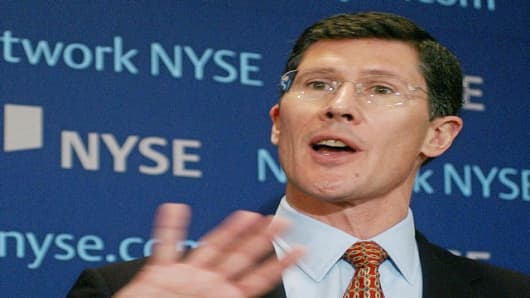Merrill Lynch CEO John Thain, who said last week that the investment bank wouldn't need to raise more capital, acknowledged Thursday that the firm may do so after all.
Thain, speaking after Merrill posted a nearly $2 billion loss, said the brokerage giant does not plan to issue common stock but is open to issuing preferred shares.
As reported Wednesday by CNBC, senior executives inside Merrill were dismayed by Thain's statement the previous week that the firm had sufficient capitaldespite huge writedowns for subprime and other risky assets.
"I wish he didn’t say that," Merrill Chief Financial Officer Nelson Chai said, believing the firm still has balance sheet issues and may need to write down further losses.
Merrill Lynch declined to comment on the executives' statements.
According to people inside the firm, Thain has been amazed at the size and scope of Merrill's subprime-related problems since taking over as chairman and CEO last December.
Though Merrill's first-quarter results were worse than Wall Street analysts' gloomy expectations, Merril shares rose amid hopes that the company was working through its problems and closer to seeing improvement.
"My sense is, they tried to clean the bad stuff off the shelves, and they hope it's mostly in the trash," said Michael Holland, founder of Holland, which oversees more than $4 billion of assets.
Besides the huge loss reported Thursday, Merrill said it plans to cut 4,000 jobs after suffering several billion dollars of write-downs.
The job cuts cover about 10 percent of staff at the world's largest brokerage, excluding financial advisers and investment associates. Merrill Lynch said the job cuts will be targeted in markets and investment banking operations and in support areas. The company has about 63,000 employees globally.
Despite the turbulence, Thain said the company has $82 billion of excess liquidity to help protect against choppy market conditions.
"This was about as difficult a quarter as I've seen in my 30 years on Wall Street," Thain told analysts during a conference call.
"We are planning for a slower and more difficult next couple of months and probably next couple of quarters, but are also hopeful for our full year 2008 results." After joining Merrill four months ago, Thain pledged to clean up the brokerage's balance sheet and take steps to make it more profitable.
He already secured more than $12 billion worth of new capital, and now has unveiled a plan to trim the company's ranks.
During the first quarter, Merrill Lynch said it suffered a $1.5 billion write-down linked to asset-backed securities, and a $3 billion write-down tied to the value of bond insurance contracts.
However, in the wake of these results, Moody's Investor Service said it may cut its long-term A1 rating on investment bank Merrill Lynch, citing deteriorating conditions in the mortgage market and more expected losses.
"Management at Merrill Lynch is focusing on the right issues for the rating - liquidity, capital and de-risking the balance sheet. However the mortgage market is not cooperating," said Peter Nerby, Senior Vice-President at Moody's in a release.
Moody's affirmed its Prime-1 short-term rating on Merrill, however, saying that the bank had a strong liquidity profile.
Fitch Ratings meanwhile affirmed Merrill Lynch's A+ issuer default rating but retained its negative outlook due to concerns over earnings, risk management and liquidity leverage. A negative outlook means a downgrade is more likely.
Merrill Lynch's shares were down 16.4 percent between the end of 2007 and Wednesday's close, compared with a roughly 25 percent decline for the broker-dealer sector as measured by the Amex securities broker-dealer index.
--Reuters and AP contributed to this story


